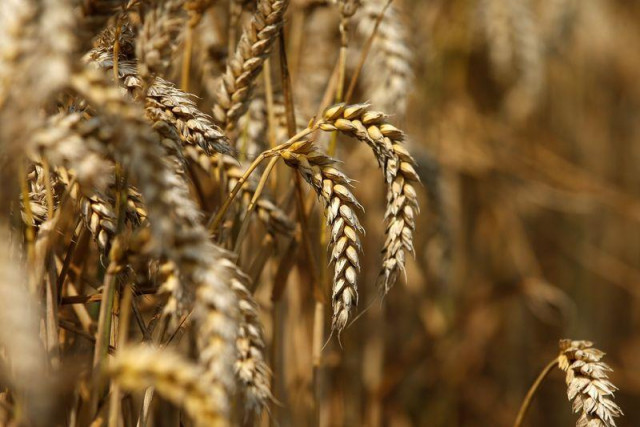Rains hamper wheat procurement in Faisalabad
Over 6,800 wheat sacks seized from hoarders in Faisalabad division

PHOTO: REUTERS
Unexpected rains and delay in harvest has hampered wheat procurement in Faisalabad division. The food department of Faisalabad has only been able to procure 29% of the 592,531 metric tonnes target set by Punjab government.
The provincial government had allocated 150,000 tonnes wheat buying target for Faisalabad district, 109,504 tonnes for Toba Tek Singh, 282,961 tonnes for Jhang and 50,066 tonnes for Chiniot district.
In compliance with the directives of higher authorities, the divisional food department had also banned private purchases, storage and transportation of wheat. Only license holders were allowed to purchase the season’s harvest.
However, sources privy to the ongoing procurement drive revealed that flour mill owners and wholesale traders in connivance with commission agents of the grain market are buying wheat directly from the farmers at the rate of Rs1,480 to Rs1,500 per maund compared to the government rate of Rs1,400 per maund.
Faisalabad Division Food Deputy Director Sardar Saifullah Joyia said that check posts have been set up to stop private wheat purchase.
“Large quantities of wheat sacks have been recovered by the administration during the anti-hoarding campaign and as many as eight First Information Reports (FIRs) were registered against the accused,” he maintained.
The official said that heavy rains have caused delay in harvesting but the administration will purchase every grain from the cultivators and achieve the procurement target at all cost.
Official sources revealed that the district administrations of Chiniot, Jhang, Toba Tek Singh and Faisalabad had confiscated 6,872 sacks of illegally purchased wheat from illegal purchasers.
Although the authorities have deputed additional staff from other departments to check inter-district transportation of wheat by private entities, they have been unable to control the illegal practice.
Meanwhile, it seems impossible for the food department to achieve the procurement target in the light of bad climate impacting the wheat crop.
Wheat growers had to face immense problems when their machinery and paraphernalia were damaged by the successive rains.
According to wheat experts, if rainwater seeps into the wheat straw, it not only causes a lower yield but also affects the quality of the grain.
Bad weather has halted harvesting and threshing in many areas of the province.
Published in The Express Tribune, May 6th, 2020.


















COMMENTS
Comments are moderated and generally will be posted if they are on-topic and not abusive.
For more information, please see our Comments FAQ